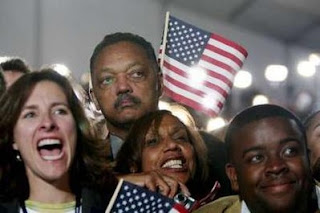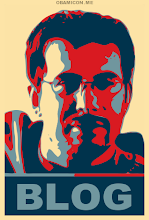Democratic diehards watching the returns at the downtown headquarters in Hayward burst into cheers after the first of the battleground states went blue.
Rhea Palmer stood in the back with tears rolling down her cheeks.
“I’m thinking about my mom right now,” said Palmer, a resident of Hayward.
Seeing an African-American elected president of the United States is something she says she thought she would never see.
Palmer’s grandmother use to bring her along to work polling places in San Francisco when she was a little girl forging a strong belief in the power of voting.
“My mom would make us vote when we were old enough,” said Palmer “She always told us to get involved and get active in our community.”
While she realizes America still has racial problems, she also sees Obama’s future presidency as an example for other African-American men to follow.
“Seeing him up there gives me so much hope that he can show other young black men what they can do,” said Palmer.
DeWayne Ramsey of Hayward finds the prospect of living under an Obama presidency as a call to the rest of the African-American community to step up.
“This is history in the making,” he said, “You know, not all black men leave their kids. Barack Obama is a family man and this is a slap in the face to that idea.”
Ramsey also views a dearth of well-known black leaders until the arrival of Obama.
“We haven’t had a role model since Martin Luther King,” he said, “Barack Obama is now our role model.”
Democrats hoping to witness history sat in front of the big screen television in rows of chairs while other mobilized for last-minute forays onto the streets hoping to reject proposition 8 from passing.
In adjoining offices, volunteers continued to call voters who had yet to vote as of six in the evening, while lawyers sat awaiting any possible problems at the polls.
According to Edith Looney, director of the Eden Area United Democratic Party, nothing but minor problems were reported around the Hayward area.
As Obama began to tick off key states like Ohio and Florida, the excitiement began to grow. They hooted when Sen. Elizabeth Dole lost her senate seat in North Carolina and clapped their hands when former education secretarty William Bennett announced on CNN, “There’s no Bradley-effect. The country has grown up.”
Steve Bacon, a former member of the Air Force, turned to crowd from his front row seat and read a text message from his phone, “President Bush needs volunteers to get his [stuff] out of the White House. Put me down for the three to eight shift!”
By 7 p.m., anticipation rose as many realized the 205 electoral votes Obama had already received coupled with the likely inclusion of California’s 55 votes, put their candidate within 10 of the presidency.
“This is going to be over by eight,” said Oakland resident Michael Vaughn.
Local politicians such as State Senator Ellen Corbett, Hayward Mayor Michael Sweeney, San Leandro Mayor Tony Santos and former assemblyman Johan Klehs begin to trickle into the offices.
Congressman Pete Stark would later arrive to thank his constituents for returning him to Washington for a 17th time.
Just as Klehs walked in, the crowd began whooping and hollering. The stunned Klehs would later learn the image of Oprah Winfrey on the television illicited the cheers and not his presence.
Just a minute after 8 p.m, the networks called the election for Obama.
Those seated exploded from the seats. Complete strangers embraced, while in a sign of the times, teenagers attached cell phones to their ears to share the news.
A 10-minute standing ovation ensued with a mixture of applause and chants of “O-ba-ma, O-ba-ma!” and “No more Bush!” thrown in for good measure.
Even as the graphic on the screen read “Barack Obama: president-elect of the United States” Michael Vaughn still had not registered what had just occured in his mind.
“I’m looking at the screen. I can read what it says, but I still don’t believe it,” an incredulous Vaughn said.
A young African-American woman stood near the doorway with a blue scarf fitted loosely around her neck. Her hands were clasped near her mouth. Tears were welling up in her eyes mixed with a smile filled with awstruck and content.
A few young girls decked out in their Catholic school dresses sat on the floor. A parent pulled
one close to explain the historical significance of the moment in their young lives.
As Sen. John McCain gave his concession speech, a red-headed high school girl mocked the Republican and yelled, “Who the maverick, now!”
The mood in the hot and humid offices turned somber as the newly elected president spoke to the throng of supporters in Chicago.
It was as if the weight of the moment hit everyone at once.
Between the idiosyncratic pauses in Obama’s speech you could faintly hear sniffles and quiet weeping.
An older white man stood in the back. His face reddened with tears ready to fall down his cheeks. His lips were pursed as he listened to Obama as if he was holding in the tears from falling.
The mood of Obama’s acceptance speech was a stark difference from the carnival atmosphere which occured when Bill Clinton won the presidency in 1992.
There was no dancing, no fist-pumping and vaguely a smile from the new president.
Democrats watching in Hayward seemed to mimic Obama’s tone.
Seated in the middle of the group was a woman, palms laying flat on her lap. Her eyes shut tightly. She was rocking slowly back and forth with each sentence Obama would utter as if in a metatative trance. She seemed in the midst of an act of spiritual cleansing with the pain floating away into the ether.
As Obama ended his speech punctuated by the campaign slogan, “Yes We Can,” she whispered the phrase a full second before Obama and slowly opened her weary eyes.


